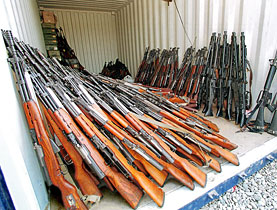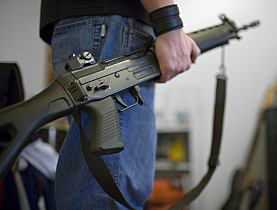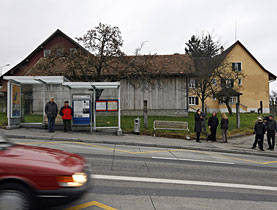Swiss on target in small arms survey

The diversion of small arms and light weapons is a major source of firearms for criminals and insurgents around the world, says an international report.
However, Switzerland was named one of the most transparent small arms exporters in the latest Small Arms Survey, published annually by the Geneva-based Graduate Institute of International Studies (GIIS).
“The score for Switzerland on transparency has improved dramatically, partly because there’s been a strong effort by the Swiss government to take seriously concerns for being transparent internationally,” Keith Krause, head of the Small Arms Survey, told swissinfo.
“It’s an issue they promote and they have improved their export reporting system.”
Every year hundreds of thousands of small arms go missing and many wind up in the hands of insurgents in countries including Iraq, Colombia and Afghanistan, the survey said.
As many as 650,000 civilian-owned weapons go missing, it added. This figure excludes the considerable amount of weapons that are diverted – usually meaning stolen or sold on the black market – from government and military stocks.
“Diversion is particularly dangerous because it can channel large volumes of weapons to individuals and groups intent on victimising civilians,” Krause said, calling on governments to be more vigilant in keeping track of small arms to make sure they are not illegally diverted to insurgents and non-state militant groups.
“We know the risk factors for diversion, the typical scenarios, as well as the methods that can stop much of this activity from occurring,” he said. “Preventing diversion is an area where states can have a significant impact for relatively little investment.”
Surplus arms
Among the countries where insurgents or non-state militant groups are benefiting from diverted small arms are Afghanistan, Colombia, Iraq, Sri Lanka, Somalia and Liberia, according to the survey.
One of the problems, it says, is the existence of massive amounts of surplus firearms and ammunition. Although it is possible to destroy such excess stocks, countries often choose to export surpluses rather than destroy them.
Out of some 200 million firearms worldwide, at least 76 million can be considered surplus, the report said. Around 430,000 surplus small-arms weapons are destroyed annually.
Two-thirds of some 20-30 million tons of military small arms ammunition worldwide can be considered surplus, it added.
Progress
Nevertheless, Krause believes progress is being made in different areas and says a number of improvements have been made this year regarding transparency.
“We noted that more than ten states scored more than 16 out of 25 points on our transparency barometer, which is an improvement over last year when there were only three,” he told swissinfo.
“Although there is still room for improvement – in major exporting states in particular.”
While some states are responsible exporters, the survey says there are often few follow-up checks once arms are delivered to make certain that the arms are not diverted to insurgents or non-state militant groups.
The most transparent small arms exporters are the United States, Italy, Switzerland, France, Slovakia and Britain, while the least transparent are Iran and North Korea, both scoring zero.
The US has accused Iran of arming and training insurgents and groups Washington lists as terrorist organisations in Iraq, Lebanon and elsewhere in the Middle East. Iran denies the allegations.
The survey lists a number of examples of suspected successful or attempted diversions of small arms shipments.
An arms broker is suspected of having used a Swiss import certificate in 2005 to get a Bosnian export licence to send 9,400 assault rifles and over 24 million rounds of ammunition to Iraq. The Swiss and Belgian governments are investigating.
swissinfo, Thomas Stephens
In September 2007 parliament banned the long-standing tradition of allowing all enlisted men to keep their ammunition at home. Ammunition held by militia soldiers must now be handed back to the army.
Also in September, the centre-left Social Democratic Party and pacifist organisations launched a people’s initiative to ban the estimated one-and-a-half million guns and rifles kept at home.
The initiative includes a call for army weapons to remain in the barracks and a national gun register.
In September 2001 Switzerland was stunned when a gunman shot and killed 14 people in Zug’s cantonal parliament with a rifle, before turning the gun on himself.
Debate on the use of firearms was further fuelled in April 2006 when the husband of former women’s ski champion Corinne Rey-Bellet killed his wife and her brother with his army pistol.
About a third of all murder cases involve private guns and army weapons. Army weapons were used in 68% of suicides, according to a recent study.
Army-issue weapons are said to be involved in the deaths of more than 300 people in Switzerland every year.
According to the Swiss foreign ministry, Switzerland is committed to the implementation of the “International Instrument to Enable States to Identify and Trace, in a Timely and Reliable Manner, Illicit Small Arms and Light Weapons”.
It is committed to the implementation of the Geneva Declaration on Armed Violence and Development.
It contributes to projects to destroy surplus small arms and light weapons and to ensure the safe storage of the same under the auspices of the Organization for Security andCooperation in Europe and the Partnership for Peace programme.
It was at Switzerland’s initiative and with Swiss funding that the “Small Arms Survey” was launched in 2001.
Switzerland supports both governments and non-governmental organisations (NGOs) with the implementation of the UN action programme.

In compliance with the JTI standards
More: SWI swissinfo.ch certified by the Journalism Trust Initiative




You can find an overview of ongoing debates with our journalists here. Please join us!
If you want to start a conversation about a topic raised in this article or want to report factual errors, email us at english@swissinfo.ch.